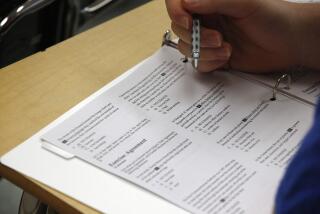The Pre-Pre-SAT
- Share via
Coming next September to an eighth grade quite possibly near you is yet another standardized test from the College Board, the organization that brought us the Advanced Placement exams, plus the SAT, SAT II and PSAT.
Since PSAT stands for the Preliminary SAT that students commonly take in ninth or 10th grade, cynics are calling this the Pre-Pre-SAT (SAT itself doesn’t stand for anything anymore). From the description of the test, that doesn’t sound far off the mark. The new Readistep exam (“Readitest” already was taken by a home drug test) covers the same basic sections: reading, writing and arithmetic. It’s slightly shorter than the PSAT and will cost less than $10 a student, an expense that schools are supposed to absorb.
Officials with the College Board offer assurances that this isn’t about pushing college admissions testing further down the ladder to ever-younger students. Schools have been requesting an exam like Readistep, they say, to help teachers and parents determine whether eighth-graders are “prepared for rigorous high school courses and for college.” Which sounds a lot like pushing college admissions testing down to ever-younger students.
The College Board’s bid to build the SAT empire comes at a time when colleges are cooling a bit to the tests. Hundreds of colleges and universities have made the SAT and its competitor admissions test, the ACT (which also used to stand for something, an apparent fashion in the testing world), optional for applicants or have otherwise lessened their role in admissions. Last month, a blue-ribbon panel convened by the National Assn. of College Admissions Counseling, led by Harvard University’s dean of admissions, delivered a report saying that the SAT and ACT had assumed too much importance in the admissions process.
Readistep is intended as a low-stakes test, meaning that students wouldn’t gain or lose much from their scores other than information on their progress so far. But low-stakes tests have a way of becoming higher-stakes tests. If Readistep becomes a gateway to honors and other advanced courses in high school, it’s easy to imagine pricey “Readistep Prep” courses, offered on weekends by the local tutoring service.
The bigger question about Readistep is why schools would need a new test to “gauge proficiencies.” Colleges understandably might find standardized tests a useful tool in gauging applicants, but between states’ standardized tests that regularly assess proficiency and students’ grades and portfolios in their courses, teachers should already be fully familiar with how well-prepared middle schoolers are for challenging high school work. If they aren’t, the problem is not that kids need more assessments, but that they need better ones.
More to Read
Sign up for Essential California
The most important California stories and recommendations in your inbox every morning.
You may occasionally receive promotional content from the Los Angeles Times.













